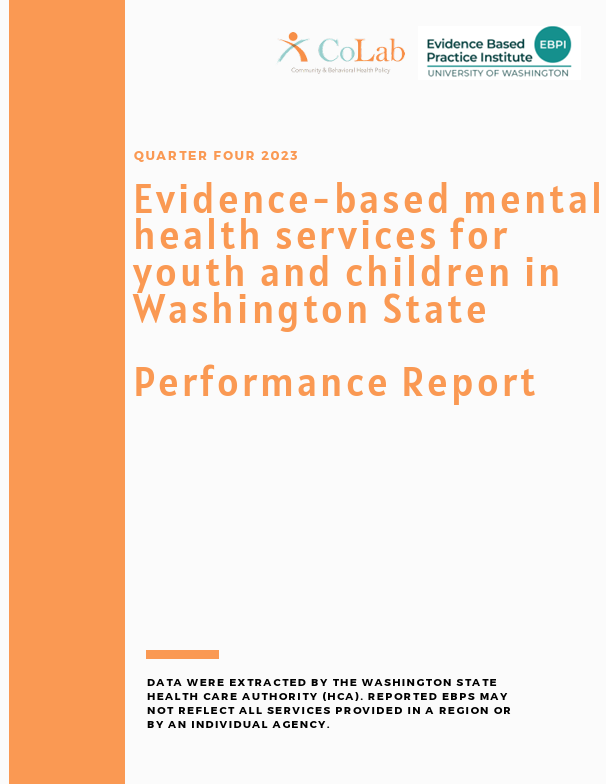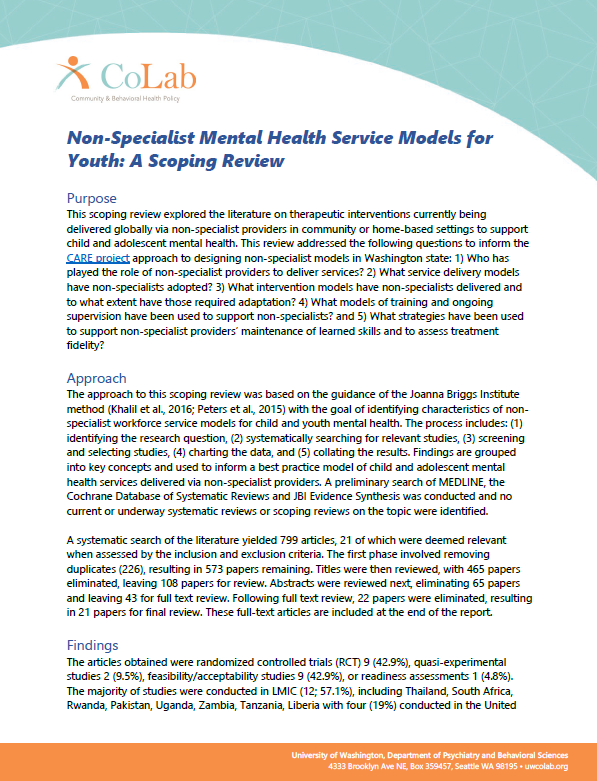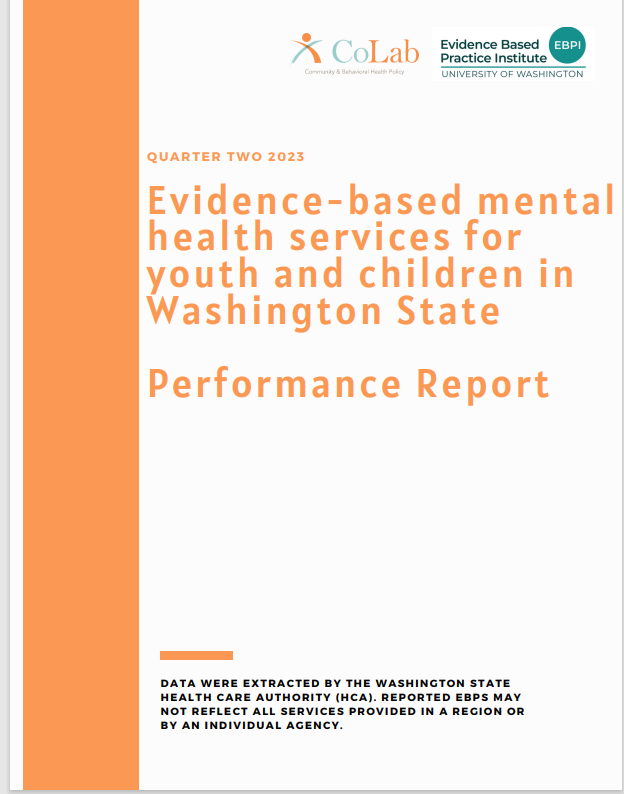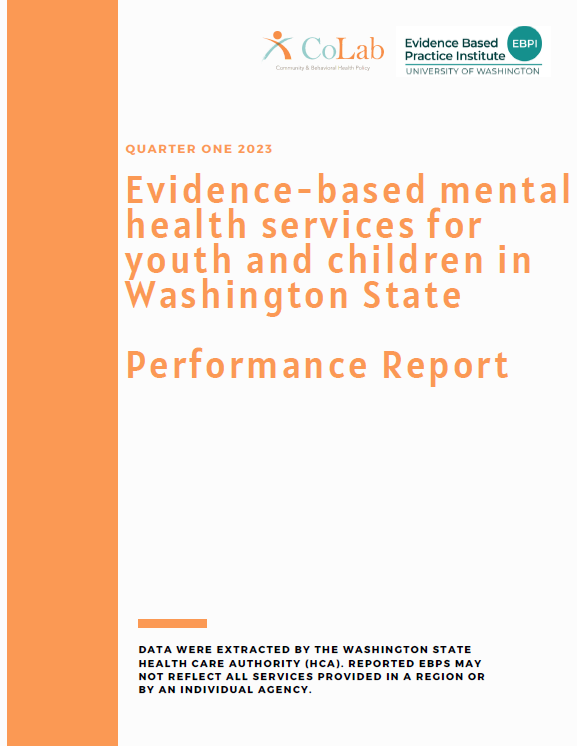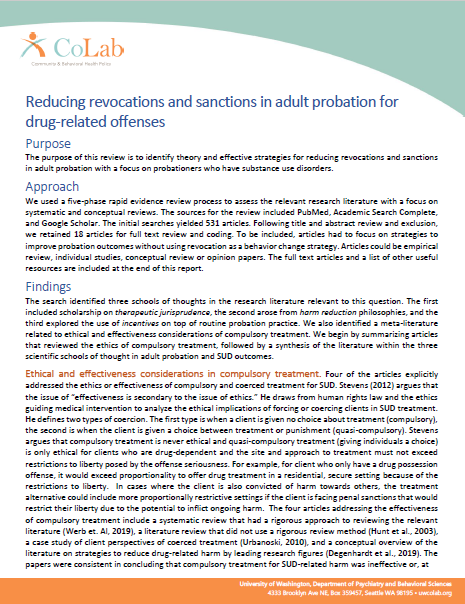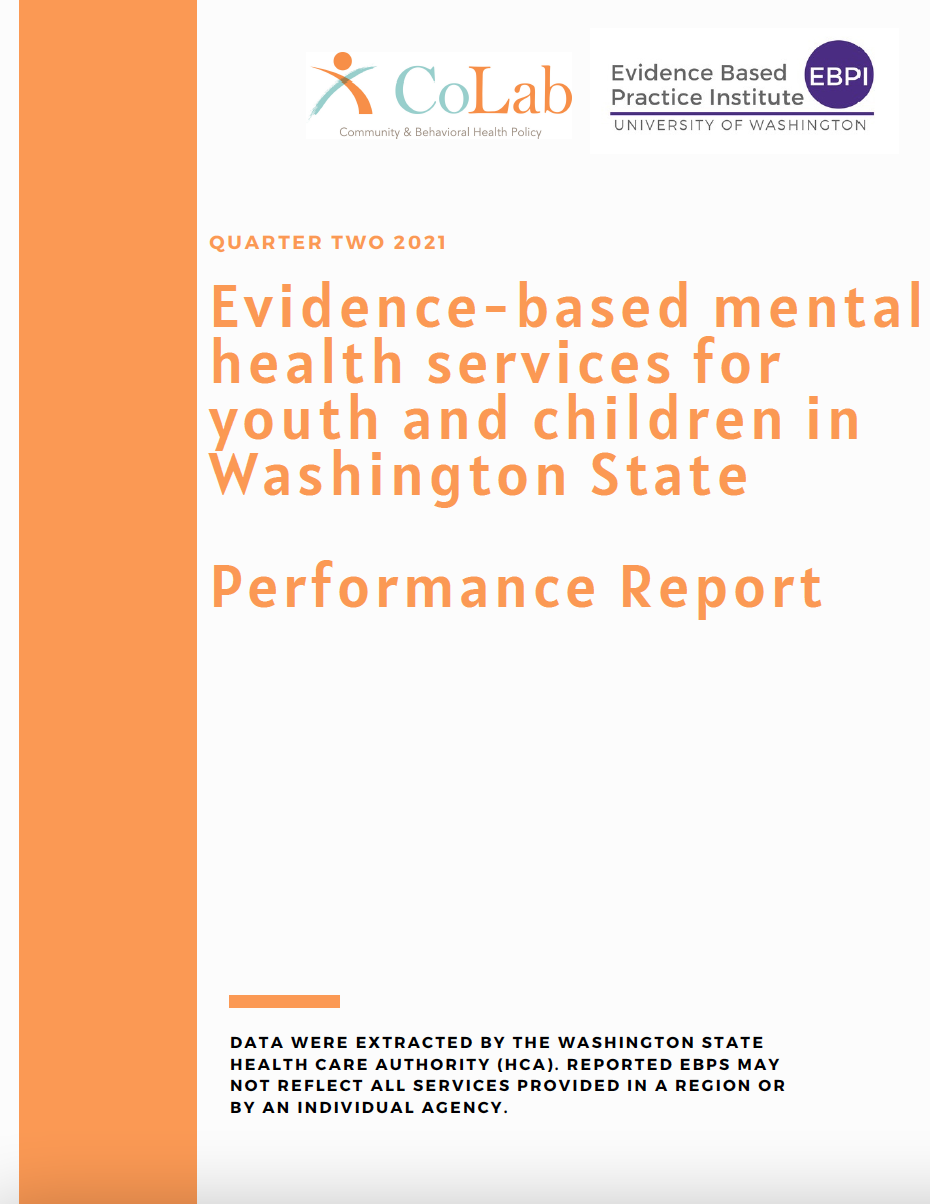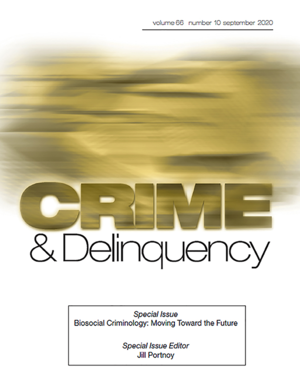Reports & Publications
Below you will find key reports and publications by UW CoLab researchers. Click through to view.
Quarter Four 2023 Evidence-based mental health services for youth and children in Washington State Performance Report
Evidence-Based Practice Institute/CoLab for Community & Behavioral Health Policy. (2023) Quarter Four 2023 Evidence-based mental health services for youth and children in Washington State Performance Report
TeleMental Health Guides for Infancy to Young Adults
Myers, K., Walker, S.C., Towle, C. (2023). Quick Guides for Infant, Child, and Young Adult Telemental Health. University of Washington CoLab for Community and Behavioral Health Policy and Behavioral Health Institute. Seattle: WA.
RESEARCH BRIEF, Housing Stability for Youth in Courts: A “cash-plus” model for legally involved youth
CoLab. (2023) Research Brief, Housing Stability for Youth in Courts: A “cash-plus” model for legally involved youth. Seattle, WA
Evidence-Based Practice Institute/CoLab for Community & Behavioral Health Policy. (2023) Quarter Three 2023 Evidence-based mental health services for youth and children in Washington State Performance Report
Evidence-Based Practice Institute/CoLab for Community & Behavioral Health Policy. (2023) Quarter Two 2023 Evidence-based mental health services for youth and children in Washington State Performance Report
Evidence-Based Practice Institute/CoLab for Community & Behavioral Health Policy. (2023). 2023 Reporting Guide for Research and Evidence-Based Practices. Seattle, WA
Evidence-Based Practice Institute/CoLab for Community & Behavioral Health Policy. (2023) Quarter One 2023 Evidence-based mental health services for youth and children in Washington State Performance Report
CoLab. (2023) Prevention and Reduction of Vicarious Trauma in the Youth Legal System: A Rapid Evidence Review. Seattle, WA
Evidence-Based Practice Institute/CoLab for Community & Behavioral Health Policy. (2022) Quarter Four 2022 Evidence-based mental health services for youth and children in Washington State Performance Report
CoLab. (2023) Reducing Revocations and Sanctions in Adult Probation for Drug-related Offenses. Seattle, WA
Evidence-Based Practice Institute/CoLab for Community & Behavioral Health Policy. (2022) Quarter Three 2022 Evidence-based mental health services for youth and children in Washington State Performance Report
CoLab. (2022) Practice Report: Value-Based Care Models in Pediatric Mental / Behavioral Health Care. Seattle, WA
Evidence-Based Practice Institute/CoLab for Community & Behavioral Health Policy. (2022) Quarter Two 2022 Evidence-based mental health services for youth and children in Washington State Performance Report
Evidence-Based Practice Institute/CoLab for Community & Behavioral Health Policy. (2022) Quarter One 2022 Evidence-based mental health services for youth and children in Washington State Performance Report
Cunningham, K., Gubner, N., Vick, K., Herting, J., & Walker, S. (2022). Redesigning juvenile probation to align with behavioral health and positive development principles: A Quasi-experimental study. Criminal Justice and Behavior.
Evidence-Based Practice Institute/CoLab for Community & Behavioral Health Policy. (2022) Quarter Four 2021 Evidence-based mental health services for youth and children in Washington State Performance Report
Evidence-Based Practice Institute/CoLab for Community & Behavioral Health Policy. (2021) Quarter Three 2021 Evidence-based mental health services for youth and children in Washington State Performance Report
Evidence-Based Practice Institute/CoLab for Community & Behavioral Health Policy. (2021). Quarter Two 2021 Evidence-based mental health services for youth and children in Washington State Performance Report
Evidence-Based Practice Institute/CoLab for Community & Behavioral Health Policy. (2021). 2021 Reporting Guide for Research and Evidence-Based Practices. Seattle, WA
Evidence-Based Practice Institute/CoLab for Community & Behavioral Health Policy. (2021) Fiscal Year 2021 Annual Report. Seattle, WA
CoLab. (2021) Effectiveness of Wilderness Therapy Programs on Mental and Behavioral Health: A Rapid Evidence Review. Seattle, WA
Gilman, A., Walker, S., Vick, K., & Sanford, R. (2021). The impact of detention on youth outcomes: A rapid evidence review. Crime & Delinquency.
Walker, S., Vick, K., Gubner, N., & Herting, J. & Palinkas, L. (2021). Accelerating the conceptual use of behavioral health research in juvenile court decision-making: Study protocol. Implementation Science Communications, 2(14).
The Judge's Role in Promoting Positive Adolescent Development & Accountability (2020). Seattle, WA: UW CoLab.
Walker, S. & Herting, J. (2020). The impact of pretrial juvenile detention on 12-month recidivism: A matched comparison study. Crime & Delinquency, 1-23.
Walker, S., Valencia, E., Miller, S., Pearson, K., Jewell, C., Tran, J., & Thompson, A. (2019). Developmentally-grounded approaches to juvenile probation practice: A case study. Federal Probation, 83(3), 33-41.
Walker, S., Duong, M., Hayes, C., Berliner, L., Leve, L., Atkins, D., Herting, J., Bishop, A., & Valencia, E. (2019). A tailored cognitive behavioral program for juvenile justice-referred females at risk of substance use and delinquency: A pilot quasi-experimental trial. PLoS ONE, 14(11).
SAJE Center. (2019). Rapid Evidence Review (RER): The Impact of Confinement-Oriented Detention on Youth Outcomes. Seattle, WA.
Almquist, L. & Walker, S. (2019, September 20). Courts, Social Services Can Work Together on Housing Instability. Youth Today. Retrieved from https://youthtoday.org/2019/09/courts-social-services-can-work-together-on-housing-instability/
McHenry, G., Crockrell, V., Holmes-Ware, L., Coil, A., Young, J., Drake, E., Hamilton, Z., McCurley, C., Peterson, A., Walker, S., & Valencia, E. (2018). Washington State Partnership on Juvenile Justice 2017 Annual Report to the Governor and State Legislature. Olympia, Washington.
Walker, S., Valencia, E., Bishop, A., Irons, M. & Gertseva, A. (2018). Developing a coordinated youth housing stability program for juvenile courts. Cityscape, 20(3), 117-137.
Walker, S., Valencia, E., & Vick, K. (2018). Report of a Research to Practice Partnership to Develop the Youth Housing Stability Model for Juvenile Courts. Seattle, WA: Center for the Study and Advancement of Justice Effectiveness (SAJE).
Walker, S., Bishop, A., Haumann, E., & Catena, J. (2017). Deploying street outreach workers to reduce failure to appear in juvenile court for youth of color: A randomized study. Crime & Deliquency, online first.
Esposito, M., Lee, H., Hicken, M., Porter, L., & Herting, J. (2017). The consequences of contact with the criminal justice system for health in the transition to adulthood. Longitudinal and Life Court Studies, 8(1), 57-74.
Walker, S. & Bishop, A. (2016). Length of stay, therapeutic change and recidivism for incarcerated juvenile offenders. Journal of Offender Rehabilitation, 55(6), p. 355-376.
Walker, S., Bishop, A., Logan-Greene, P., Nurius, P. (2016). The heterogeneity of treatment needs for justice involved girls: A typology using latent class analysis. Criminal Justice and Behavior, 43(3), 323-342.
Lee, T., Walker, S., & Bishop, A. (2016). The impact of psychiatric practice guidelines on medication costs and youth aggression in a juvenile justice residential treatment program. Psychiatric Services, 67(2), p.214-220.
Correll*, J., Walker, S., Edwards, T. (2016). Parent perceptions of participating in a program for adolescents who are violent at home. Journal of Family Violence, online first.
Walker, S., Bishop, A., Pullmann, M., Bauer, G. (2015). A research framework for understanding the practical impact of family involvement in the juvenile justice system: The juvenile justice family involvement model. American Journal of Community Psychology, online first.
Walker, S., Bumbarger, B., & Phillippi, S. (2015). Achieving successful evidence-based practice implementation in juvenile justice: The importance of diagnostic and evaluative capacity. Evaluation and Program Planning, 52, 189-197.

